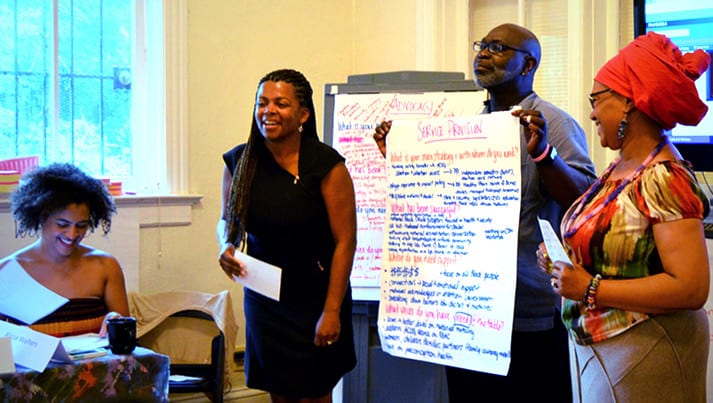Tools of Transformation

A Center-sponsored toolkit equips reproductive health advocates in the South with resources to confront the growing maternal health crisis for Black women.
Across the United States, Black women die or suffer serious illness during and after childbirth in dramatically disproportionate numbers—three to four times higher—than do their white counterparts. The pattern is evident in urban areas with large Black communities, but is most extreme in the South, where in some places—like rural Mississippi—Black women suffer fatal pregnancy-related complications at a rate nearly 20 times the national average. These racial disparities have been shown to persist regardless of income and education level.
Participants in the Black Mamas Matter project—who gathered for a convening this past week in Atlanta—know the statistics all too well. This group of researchers, policy experts, service providers, and community organizers came together from across the South to discuss the policy climate around Black maternal health in their states and to develop strategies to address the growing health and human rights crisis around maternal mortality and morbidity.
To coincide with the convening, the Center for Reproductive Rights—co-leaders of Black Mamas Matter with SisterSong Women of Color Reproductive Justice Collective—released a toolkit for state advocates. Drawing on their insights from a similar convening one year ago, this new resource provides resources to advance the right to safe and respectful maternal health care in the South.
The toolkit offers research on the causes of maternal mortality and morbidity, extensive policy recommendations, a human rights analysis of the maternal health crisis, and resources to engage other stakeholders across the country through targeted messaging and talking points.
As stark as the problem of maternal mortality in the Black population appears, advocates seeking to improve Black women’s maternal health know the causes—and solutions—are as complex as the question of race itself.
Take the story of someone like Kayla from Mississippi—who shared some of her reproductive health experiences during a story circle led by SisterSong in 2014:
With my twins, I worked so much right after the six weeks [of maternity leave], I didn’t even see them, I wouldn’t even see them awake. I would turn them over to my mother or grandmother in the morning when they were still asleep, and I would come home at night and they’d be still asleep. When they cut their first teeth, I didn’t even know for three days because I didn’t see them. I worked two jobs so I would work 16-hour days. . . . If I hadn’t had my mother and my grandmother to babysit for me, I don’t know what I would have done. Breastfeeding was horrible because I was trying to exclusively breastfeed and I worked in low-wage, hourly work—like fast food work—and they don’t give you breaks. It’s not like, ‘Hey, my boobs are full. I need to go pump. Can somebody go waitress for me?’ That doesn’t happen.
Kayla also reported that when one of her daughters was born with several malformations to the hands and feet, doctors refused to let her hold her baby and instead interrogated her for hours about suspected drug use. This story, along with others of women in Atlanta and Jackson, Mississippi, were compiled in Reproductive Injustice, a joint report by the Center and SisterSong to the UN Committee on the Elimination of Racial Discrimination in 2014.
The role of race in Kayla’s experience is multi-layered. Aside from the evident discrimination, how do we quantify and address the toll that the chronic stress of being Black in America takes on a body? Or the exhaustion of a woman who makes 64 cents to every male dollar, works two jobs, and still can’t make ends meet? How do we measure the poverty of a woman who fears bringing a child into the world due to the violence likely to haunt him there?
These questions—and their answers—are at the center of reproductive justice, a framework developed by women of color in the United States, that expands the concept of reproductive freedom beyond the ability to decide when or whether to have a child. A reproductive justice approach aims to secure the context into which children are born and ensure conditions that allow all families to thrive.
Using a human rights and reproductive justice lens, Black Mamas Matter emphasizes the fundamental rights to health, life, and freedom from discrimination against pregnant and birthing women. At the same time, Black Mamas Matter highlights the responsibility of government to ensure safe and respectful maternal health care for all.
Black Mamas Matter builds on the Black Lives Matter movement’s examination of the constellation of factors that put the bodies and lives of Black men, women, and children at risk. One of these factors is lack of access to quality health care, which is both a symptom and a cause of deepening social inequality. It is estimated that approximately 40 percent of maternal deaths could be prevented if all women had access to quality health care.
“Improving health care access and quality will help, but we also need to address the root causes of Black maternal mortality in the health care system and beyond,” says Katrina Anderson, Interim Director of U.S. Human Rights and Foreign Policy. “We are excited to offer a toolkit that embraces this perspective and offers holistic policy solutions—such as ways to improve data collection to better understand how racial discrimination becomes a factor in maternal death, expand health care coverage, and hold government accountable to its obligation to ensure the human right to safe and respectful maternal health care.”
